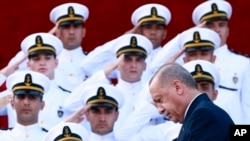Turkey's president threatened Saturday to launch a unilateral offensive into northeastern Syria if plans to establish a so-called safe zone along Turkey's border fail to meet his expectations, including a demand that Turkish soldiers control the corridor.
Speaking to graduates of a military academy in Istanbul, Recep Tayyip Erdogan said the U.S. had up to three weeks to satisfy Turkish demands.
Earlier in August, Turkish and U.S. officials agreed to set up the zone east of the Euphrates River. Ankara wants U.S.-backed Syrian Kurdish fighters, considered terrorists by Turkey, to pull back from the border.
``If our soldiers do not start to control the area actively, we will have no choice but to activate our own operational plans,'' Erdogan said.
Turkey has been pressing to control — in coordination with the U.S. — a 19-25-mile (30-40-kilometer) zone within civil war-ravaged Syria, running east of the Euphrates all the way to the border with Iraq.
Temporary accord
On Friday, Erdogan said Turkish officials had ``temporarily'' agreed to a safe zone proposed by the U.S. that was narrower than 20 miles (32 kilometers).
The two countries set up a joint operations center in Turkey's border province of Sanliurfa this month and started helicopter patrols. But Turkish officials have repeatedly vowed to go it alone if the U.S. delays safe zone plans.
Turkey sees the Syrian Kurdish fighters, who make up most of the Syrian Democratic Forces, as an extension of a Kurdish insurgency within Turkey. American troops are stationed in northeast Syria, along with the Kurdish forces, and they have fought the Islamic State group together. The differing positions on the Kurdish fighters have become a major source of tension between NATO allies Turkey and the U.S.
Erdogan said his visit to New York in September for the U.N. General Assembly, where he's expected to meet President Donald Trump, would be a ``last chance'' before a Turkish offensive.




